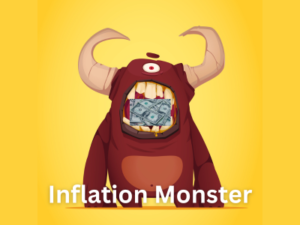What is Inflation – the invisible money eating monster? (Inflation Monster) | How to mitigate inflation?
Overview of Inflation
In Personal Finance, it is very important to understand a monster called Inflation and the role it plays in our wealth building efforts.
Inflation is a measure of the rate at which the general level of prices for goods and services is rising over time.
Inflation is measured by the Consumer Price Index (CPI), which measures the change in the prices of a basket of goods and services purchased by households.
In India, the CPI is calculated for different groups of goods and services, such as food, fuel, housing, clothing, and transportation.

1. The Impact of Inflation Monster on Personal Finances:
The impact of inflation on personal finances in India can be significant, especially for those on fixed incomes or with limited financial resources.
Inflation affects the cost of living, which in turn affects the purchasing power of individuals and households.
The impact of inflation on personal finances can be seen in the following ways:
Increase in the cost of living:
Inflation leads to an increase in the cost of living, which means that the same amount of money can buy fewer goods and services over time.
For example, if the inflation rate is 5%, then a basket of goods and services that cost Rs. 100 today will cost Rs. 105 next year.
This means that individuals and households have to spend more money to maintain the same standard of living.
Food Inflation:
Food inflation is one of the biggest contributors to inflation in India.
In 2020, food inflation reached a 10-year high of 14.87%, which had a significant impact on the cost of living for individuals and households.
The cost of essential food items such as vegetables, fruits, and pulses increased significantly, which meant that households had to spend more money on their monthly grocery expenses.
Fuel Inflation:
Fuel inflation is another major contributor to inflation in India.
In 2022, the price of petrol and diesel reached an all-time high, which had a significant impact on the cost of transportation and the cost of living.
The increase in fuel prices also led to an increase in the cost of goods and services, as transportation costs are a major component of the cost of goods and services.
Following table shows increase in petrol prices in the last 10 years.

Decrease in the purchasing power of money: (How does inflation eat money?)
Inflation decreases the purchasing power of money, which means that the same amount of money can buy fewer goods and services over time.
This affects the savings and investment decisions of individuals and households, as they have to adjust their savings and investment plans to keep up with inflation.
For example, if an individual saves Rs. 1 lakh today and the inflation rate is 5%, then the value of their savings will decrease to Rs. 95,000 next year.
Increase in the cost of borrowing:
Inflation leads to an increase in the cost of borrowing, as lenders charge higher interest rates to compensate for the loss of purchasing power of money over time.
This affects the borrowing decisions of individuals and households, as they have to pay higher interest rates on loans and credit card debts.
For example, if the inflation rate is 5% and the interest rate on a loan is 10%, then the real interest rate is only 5%, which means that the lender is not earning any real return on their investment.
Increase in the cost of healthcare:
Inflation affects the cost of healthcare, which is a major expense for individuals and households.
In India, healthcare inflation has been rising rapidly, and it is expected to increase further in the coming years.
This means that individuals and households have to spend more money on healthcare expenses, which can have a significant impact on their personal finances.
Increase in the cost of education:
Inflation also affects the cost of education, which is a major expense for families with children.
The cost of education in India has been rising rapidly, and it is expected to increase further in the coming years.
This means that families have to spend more money on education expenses, which can have a significant impact on their personal finances.
2. Ways to Mitigate the Impact of Inflation on Personal
Finances:
The impact of inflation on personal finances can be mitigated by taking certain steps. Some of the ways to mitigate the impact of inflation on personal finances are:
Investing in Inflation-Protected Securities:
Investing in inflation-protected securities is one way to mitigate the impact of inflation on personal finances.
Inflation-protected securities, such as inflation-indexed bonds, provide returns that are adjusted for inflation, which means that the returns earned by investors are protected from the impact of inflation.
Investing in Equities:
Investing in equities is another way to mitigate the impact of inflation on personal finances.
Equities have historically provided returns that are higher than the rate of inflation, which means that investing in equities can help individuals and households maintain their purchasing power over time.
Investing in Real Estate:
Investing in real estate is another way to mitigate the impact of inflation on personal finances.
Real estate has historically provided returns that are higher than the rate of inflation, which means that investing in real estate can help individuals and households maintain their purchasing power over time.
Budgeting and Saving:
Budgeting and saving are essential to mitigate the impact of inflation on personal finances.
By budgeting and saving, individuals and households can reduce their expenses and increase their savings, which can help them maintain their purchasing power over time.
Conclusion:
Inflation is an important economic indicator that affects personal finances, businesses, and the economy as a whole.
The impact of inflation on personal finances in India can be significant, especially for those on fixed incomes or with limited financial resources.
Acting like money eating monster, the Inflation affects the cost of living, the purchasing power of money, the cost of borrowing, the cost of healthcare, and the cost of education.
The impact of inflation on personal finances can be mitigated by investing in inflation-protected securities, equities, and real estate, as well as by budgeting and saving.
#inflationmonster #inflation
